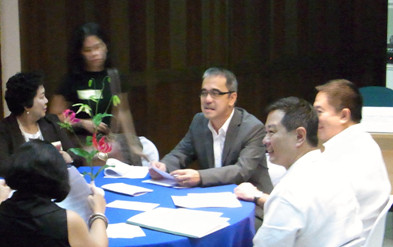 The Department of Science and Technology (DOST) and the Intellectual Property Office of the Philippines (IPO) recently issued the implementing rules and regulations (IRR) of Republic Act 10055, otherwise known as the Technology Transfer Act of 2009.
The Department of Science and Technology (DOST) and the Intellectual Property Office of the Philippines (IPO) recently issued the implementing rules and regulations (IRR) of Republic Act 10055, otherwise known as the Technology Transfer Act of 2009.
The Technology Transfer Act is a landmark law that would usher the growth of the country’s innovation potential through efficient transfer of technologies, specifically those funded by public funds.
The IRR, contained in the Joint DOST-IPO Administrative Order 02-2010, was jointly signed on August 19 by DOST Secretary Mario G. Montejo and IPO Director General Ricardo R. Blancaflor in their capacities as Chair and Co-chair, respectively, of the Joint IRR Drafting Committee. The IRR took effect on September 8.
The IRR underlines the main intent of the law, which is lodging ownership of the intellectual property rights (IPRs) to research and development institutes (RDIs), by setting parameters on copyright ownership and recovery of the IPR ownership.
To facilitate commercialization of IPRs through spin offs, the IRR provides for the rules of the Fairness Opinion Report and the Fairness Opinion Board. The Fairness Opinion Report is an alternative to the rigid government procurement process, which usually hampers efficient transfer of technologies to the market.
Common provisions, involving stipulations in the research funding agreement, protection of undisclosed information and rules on disclosure are also included in the IRR.
In terms of revenue sharing, the provisions in the research agreement or the employer-employee contract shall govern. In any case, however, the term revenue shall be defined in the agreement and where practicable, non-monetary revenues will be converted to cash.
To ensure smooth and swift transfer of technologies, the implementing rules also encourages the establishment a Technology Transfer Protocol among RDIs, which sets the guidelines in forming a spin off company and setting parameters in revenue sharing involving non-monetary grants. It also encourages the establishment of Technology Licensing Offices in whatever form and the formulation of the RDIs’ own policies on IPR management and technology transfer.
In case of any dispute in determining government ownership, this shall be subject to arbitration and mediation under IPO rules.
RA 10055, authored by Rep. Joseph Emilio Abaya and Sen. Edgardo Angara, respectively was signed into law by former President Gloria Arroyo on March 23 and took effect last May 8.
The making of the IRR
 Early on, national consultations were held last July 16 and August 13 to solicit inputs from concerned stakeholders.
Early on, national consultations were held last July 16 and August 13 to solicit inputs from concerned stakeholders.
Dr. Albert P. Aquino, PCARRD Socio-Economics Research Division director and chair of the DOST Technical Working Committee on Tech Transfer, said that the activity encourages support for and ownership of the policy from stakeholders.
Noel Catibog, PCARRD’s IP focal person, served as resource person during the IRR deliberation.
Incidentally, PCARRD has been at the forefront of the DOST-wide policy advocacy of the Tech Transfer law since its inception in 2006.
At present, DOST and IPO are coordinating with the Department of Trade and Industry to come up with separate guidelines on IP valuation, commercialization, and information sharing. Alongside, the DOST Policy and IEC Groups are also preparing for the information dissemination campaign to promote the IRR among stakeholders.
